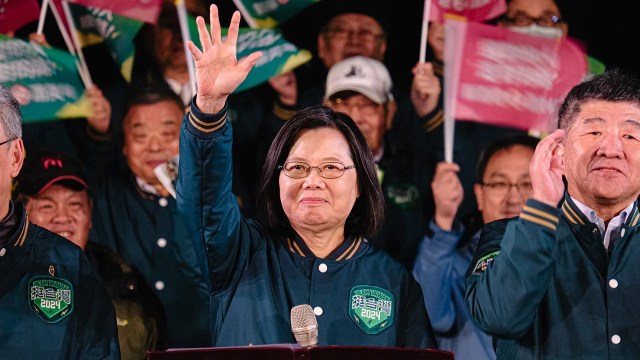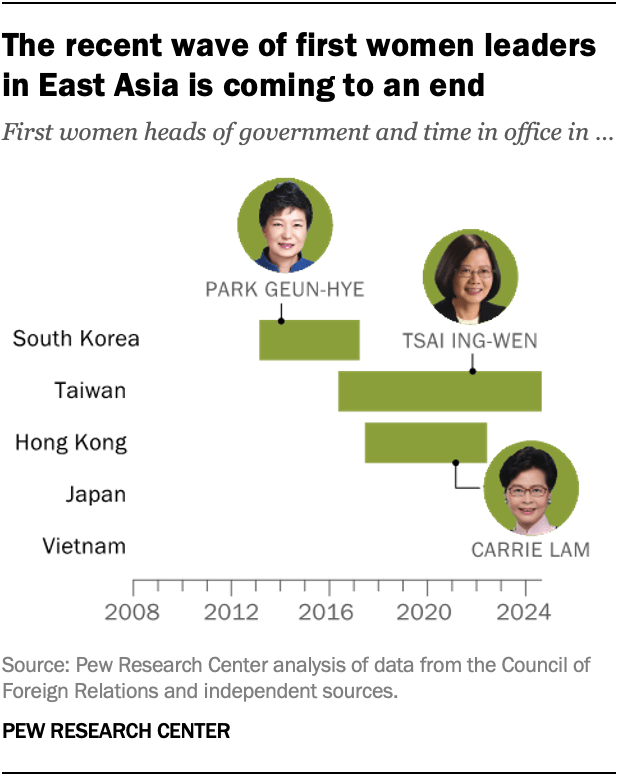
When Tsai Ing-wen became president of Taiwan in 2016, Taiwan joined Korea among the first places in East Asia to ever have a woman as head of government. The following year, Carrie Lam took over as Hong Kong’s first female chief executive.
But when Tsai’s term ends in May, East Asia will have no women in highest office. In fact, only one woman will serve as head of government anywhere in Asia, excluding the Pacific Islands (Sheikh Hasina of Bangladesh).
Despite the current and historic lack of female leadership in East Asia, many people across the region believe that women and men make equally good political leaders, according to a 2023 Pew Research Center survey conducted in Hong Kong, Japan, South Korea, Taiwan and Vietnam.

The data used in this analysis is part of a larger Pew Research Center project examining religion, spirituality and nonreligion in East Asia. The five places this analysis covers are Hong Kong, Japan, South Korea, Taiwan and Vietnam.
Several other places that are generally considered part of East Asia are not included due to survey fieldwork limitations. For example, China does not currently allow non-Chinese organizations to conduct surveys in the mainland, and public opinion surveys cannot be conducted in North Korea. While surveys are possible in Mongolia, the share of people we can reach does not meet the Center’s threshold to report population-level estimates because of the nomadic nature of large segments of the population.
Pew Research Center conducted this analysis to assess how adults in East Asia view gender and political leadership.
The data comes from a survey of 10,390 adults (ages 18 and older) in five places in East Asia: Hong Kong, Japan, South Korea, Taiwan and Vietnam. In the first four places, interviews were conducted over the telephone. In Vietnam, interviews took place face-to-face. All surveys were conducted between June 2 and Sept. 17, 2023.
This survey is part of the Pew-Templeton Global Religious Futures project, which analyzes religious change and its impact on societies around the world.
Respondents were selected using probability-based sample designs. The data was weighted to account for different probabilities of selection among respondents and to align with demographic benchmarks for adult populations.
The analysis of women leaders focuses on the head of government as defined by the local political system or constitution. Depending on the location, “head of government” could mean president or prime minister, but not both. Heads of state, monarchs and interim leaders are excluded from this analysis.
Here are the questions used for this analysis, along with responses, and the survey methodology.
How people in each place view male and female leadership

Japan has never had a female prime minister, and the lack of female representation in its politics has drawn increasing attention and activism. Yet, of the five places surveyed, Japan reports the highest share of people who say that men and women generally make equally good leaders (86%) and the lowest share who say that men make better leaders (9%).
In South Korea, which has also made recent news for the gender gap in its legislature, eight-in-ten say that men and women make equally good political leaders.
Similarly, in Hong Kong, Taiwan and Vietnam, at least three-quarters or more say that women and men make equally good leaders.
Although Taiwan has had a female president for the last eight years, 13% of adults there still say that in general, men make better political leaders. This view is less common among those who feel close to Tsai’s Democratic Progressive Party (8%) and more common among those who support the opposition Kuomintang (25%).
Related: Most people in Taiwan see themselves as primarily Taiwanese; few say they’re primarily Chinese
And in Vietnam, which has never had a female head of government, two-in-ten say men make better leaders, one of the highest shares across the five surveyed places.
No more than 4% in any of the five places say women make better political leaders than men.
How men and women view male and female leadership

Across the five places surveyed, men are generally more likely than women to say that men make better leaders. However, no more than around a quarter of men say this in any of these places.
Women are generally no more likely than men to say that women make better leaders. However, in Korea and Vietnam, they are more likely to say women and men make equally good leaders.
Note: Here are the questions used for this analysis, along with responses, and the survey methodology.
